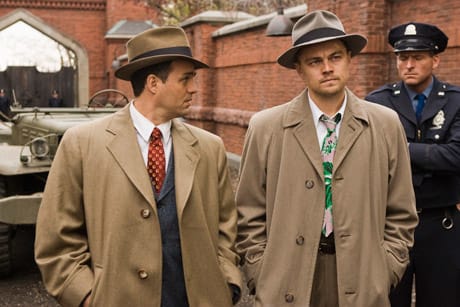It is said that film noir arose from an atmosphere of post-WWII despair, and Martin Scorsese's Shutter Island is like an articulation of these feelings. According to Variety's Todd McCarthy, the film "arguably occupies a similar place in Martin Scorsese's filmography as The Shining does in Stanley Kubrick's," and that's probably fair. As with the Kubrick film, Shutter Island is an extraordinary example of its genre while also transcending it: a thriller about nothing less than man's inhumanity to man.
Set in 1954, the film follows war veteran turned U.S. marshal Teddy Daniels (Leonardo DiCaprio) and his new partner, Chuck Aule (Mark Ruffalo), as they investigate the disappearance of an inmate of Ashecliffe, a hospital for the criminally insane on the remote Shutter Island. Teddy, however, has other motivations for taking on the investigation, including finding the alleged killer of his wife and children, and discovering the truth behind the hospital establishment's more hideous practises.
Based on a pulp novel by Dennis Lehane, Shutter Island is being knocked in some quarters as a hacky genre exercise, à la Scorsese's Cape Fear, and on a superficial level the film works on those terms. Scorsese directs with supreme confidence, seamlessly melding reality and hallucination. With Ashecliffe, he has created one of his most palpable locations, particularly Ward A, where the most fearsome inmates are held. Scorsese gives us little sense of this building's geography, and the viewer becomes lost in its damp maze of rotting concrete and rusting staircases.
But this is as much a suspense film as Antichrist was a horror film. We learn that Teddy lost his faith in God after witnessing the atrocities of the Nazi death camps, and he later has an uneasy debate with an Ashecliffe official about man's selfish, violent nature. Like the best film noirs of the '40s and '50s, Shutter Island shudders with the paranoia and dread that pervaded the Cold War, which still resonates today.
With the Ashecliffe elite so powerful and manipulative, Teddy Daniels can trust no one, least of all himself. What makes Shutter Island and its ambiguous ending so genuinely frightening is the implication that in a corrupt, Godless universe all we have are our own easily skewed moral compasses to guide us.
(Paramount Pictures)Set in 1954, the film follows war veteran turned U.S. marshal Teddy Daniels (Leonardo DiCaprio) and his new partner, Chuck Aule (Mark Ruffalo), as they investigate the disappearance of an inmate of Ashecliffe, a hospital for the criminally insane on the remote Shutter Island. Teddy, however, has other motivations for taking on the investigation, including finding the alleged killer of his wife and children, and discovering the truth behind the hospital establishment's more hideous practises.
Based on a pulp novel by Dennis Lehane, Shutter Island is being knocked in some quarters as a hacky genre exercise, à la Scorsese's Cape Fear, and on a superficial level the film works on those terms. Scorsese directs with supreme confidence, seamlessly melding reality and hallucination. With Ashecliffe, he has created one of his most palpable locations, particularly Ward A, where the most fearsome inmates are held. Scorsese gives us little sense of this building's geography, and the viewer becomes lost in its damp maze of rotting concrete and rusting staircases.
But this is as much a suspense film as Antichrist was a horror film. We learn that Teddy lost his faith in God after witnessing the atrocities of the Nazi death camps, and he later has an uneasy debate with an Ashecliffe official about man's selfish, violent nature. Like the best film noirs of the '40s and '50s, Shutter Island shudders with the paranoia and dread that pervaded the Cold War, which still resonates today.
With the Ashecliffe elite so powerful and manipulative, Teddy Daniels can trust no one, least of all himself. What makes Shutter Island and its ambiguous ending so genuinely frightening is the implication that in a corrupt, Godless universe all we have are our own easily skewed moral compasses to guide us.
